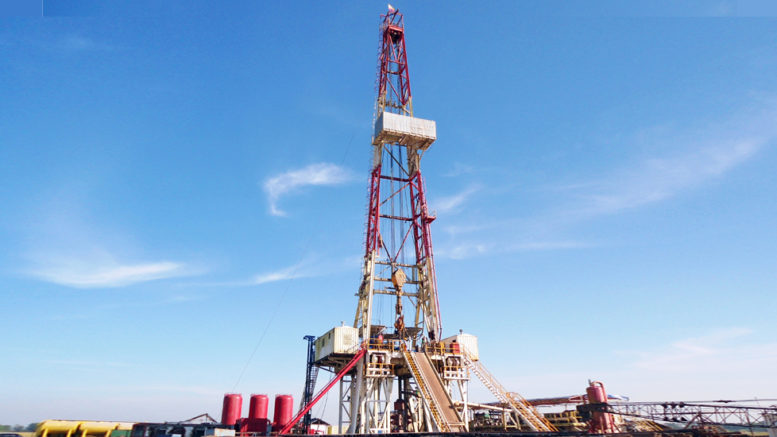- Chinese company strikes oil, additional gas reserve
Poly-GCL, the Chinese company engaged in oil and gas exploration and development project in the Ethio-Somali Regional State, Ogaden basin, has discovered oil and gas deposits.
Poly-GCL, which signed petroleum exploration and development agreement with the then Ministry of Mines in November 2013, has been prospecting for oil and gas reserve in a vast exploration area in the Ogaden basin. The company is also trying to develop the Calub and Hilala gas fields which was found in the Ogaden basin many years ago.
Koang Tutlam (MD), state minister of the Ministry of Mines, Petroleum and Natural Gas, told The Reporter that Poly-GCL has discovered additional gas reserves in the Calub gas field. “In the appraisal wells the company drilled around Calub it has discovered additional gas reserve. If you remember we were talking about 4.7 Trillion Cubic Feet (TCF) of gas reserve. Now the recoverable gas amount reached 6-8 TCF. The amount has increased significantly,” Dr. Koang said.
Dr. Koang said Poly-GCL has discovered some amount of oil in the new exploration wells it drilled around Hilala locality, 1,200 km southeast of Addis Ababa. “In the new exploration wells they drilled they have found some oil. But we do not have figures right now. The company is making assessment to determine the amount of oil. We will reveal the figures once the assessment is completed.”
The Calub and Hilala gas fields were discovered by an American company called Tenneco in 1972. Former Union of Soviet Socialist Republics (USSR) oil firm, Soviet Petroleum Exploration Expedition (SPEE), which was prospecting for oil in the Ogaden basin in 1980s, confirmed the gas reserves in Calub and Hilala localities estimated at four TCF.
A veteran petroleum geologist told The Reporter that Poly-GCL has found additional gas reserve in the same Calub structure but in a different horizon. “They have been drilling additional wells to appraise the existing gas reserve. So they must have found additional reserve in a different horizon.”
The petroleum geologist said it was not for the first time when trace of oil was found in the Hilala locality. Tenneco discovered a non-commercial oil reserve in Hilala in 1973. Oil shows have also been noted in various exploration wells drilled in Hilala and Elkuran localities.
The petroleum expert said that the Chinese now came up with a latest oil exploration technology that enabled them to identify what the Americans did not see. “They have not found a new structure but they have discovered some oil in a different horizon. The Americans and Russians were working in the Ogaden in the 1960s, 70s and 80s. Now we are in 2018 and the Chinese have an advanced exploration technologies that enable them to trace the hydrocarbon resources.”
The petroleum expert pointed out that Poly-GCL has conducted 3D and 2D seismic surveys that helped them to undertake “successful” exploration work. However, he said it was too early to forecast the amount of oil reserve that the Chinese discovered. “It is only after successive well taste and exhaustive geo chemical laboratory analysis that they can determine the amount of the reserve. At this moment one cannot tell that the reserve is commercial or not.”
Poly-GCL has subcontracted another Chinese company, BGP Geo Services, which has been collecting seismic data in the license area covering 93,000 sq.km of arid land.
In addition to the ongoing exploration work, Poly-GCL is trying to exploit the natural gas reserves in the Calub and Hilala gas fields. Eight gas production wells have been drilled and made ready for production in Calub. Poly GCL planned to extract the gas reserve in Calub and Hilala and export it via a gas pipeline that would be constructed from the gas fields to all the way to the port of Djibouti.
Dr. Koang told The Reporter that works on the gas development project is progressing. “Poly-GCL has signed agreement on the pipeline construction with the governments of Ethiopia and Djibouti. We (the Ethiopian government) are now negotiating with the Government of Djibouti on the pipeline construction. It is an intergovernmental negotiation,” he said.
According to Dr. Koang, Poly-GCL will build an LNG plant in Djibouti that would change the gas into liquid natural gas which will be exported to China with special LNG vessels. The total cost of the gas development project is estimated at four billion dollars. Dr. Koang said Poly GCL would start exporting gas by 2021.
In the meantime, Poly GCL is working on the gas development plan. “They are working on the pipeline construction plan,. They are working on it with full swing,” Dr. Koang said.
If Poly-GCL’s gas field development project comes to fruition Ethiopia would soon become a hydrocarbon producing country.
Discover more from Idil News
Subscribe to get the latest posts sent to your email.


